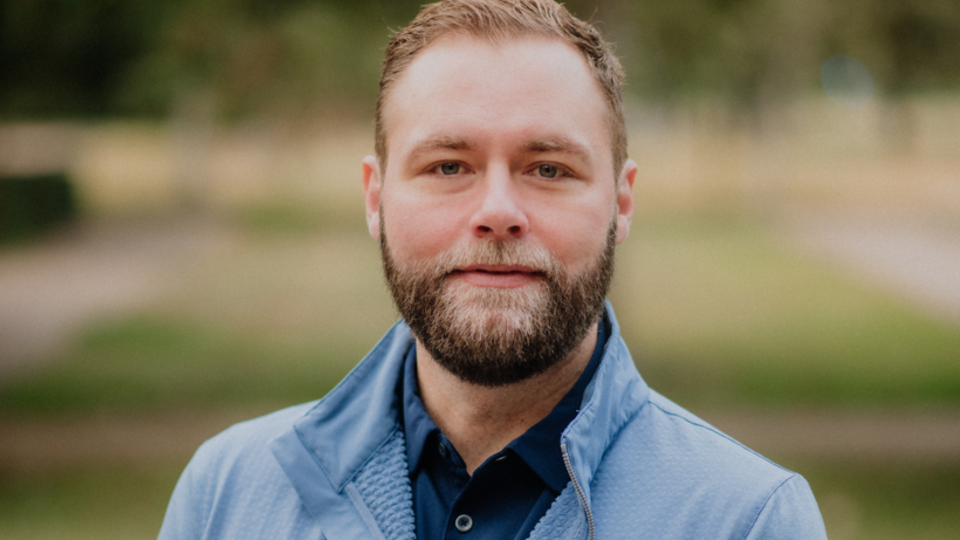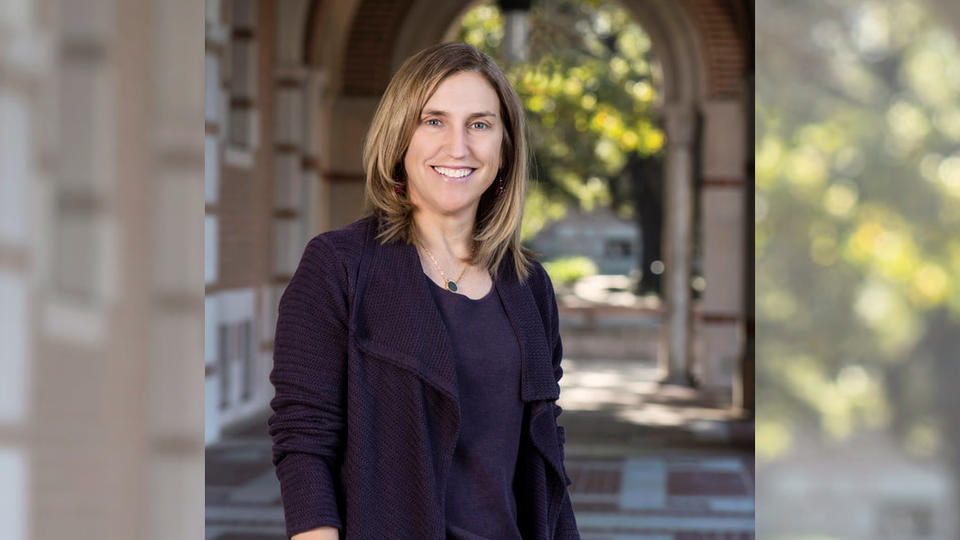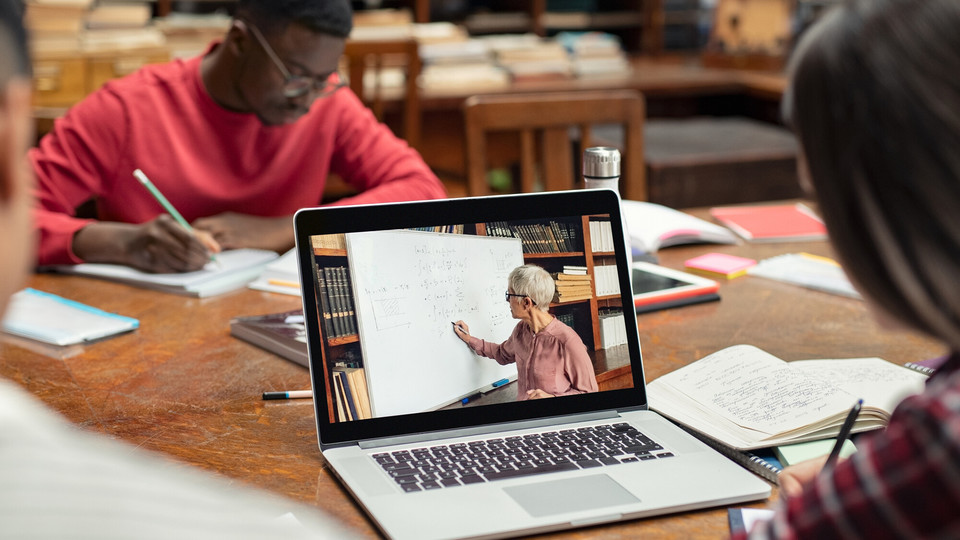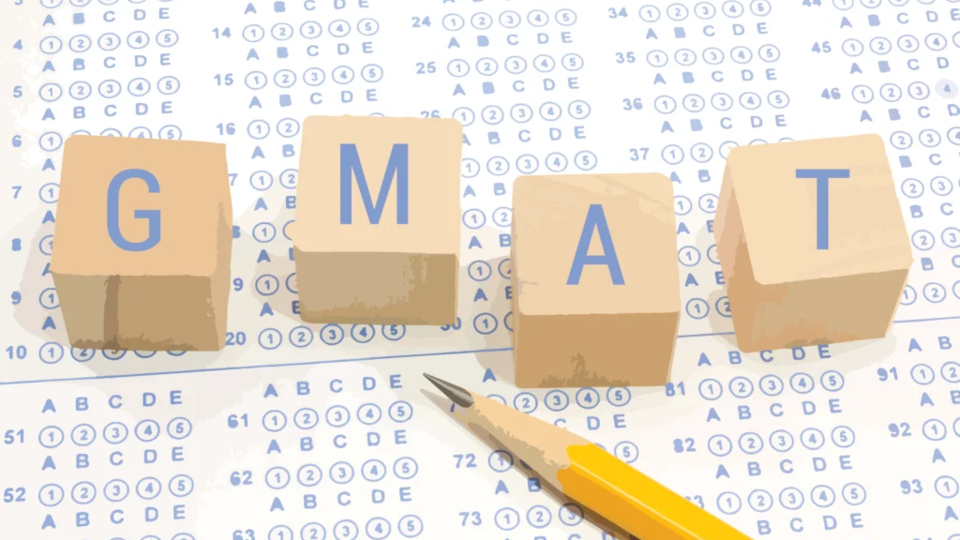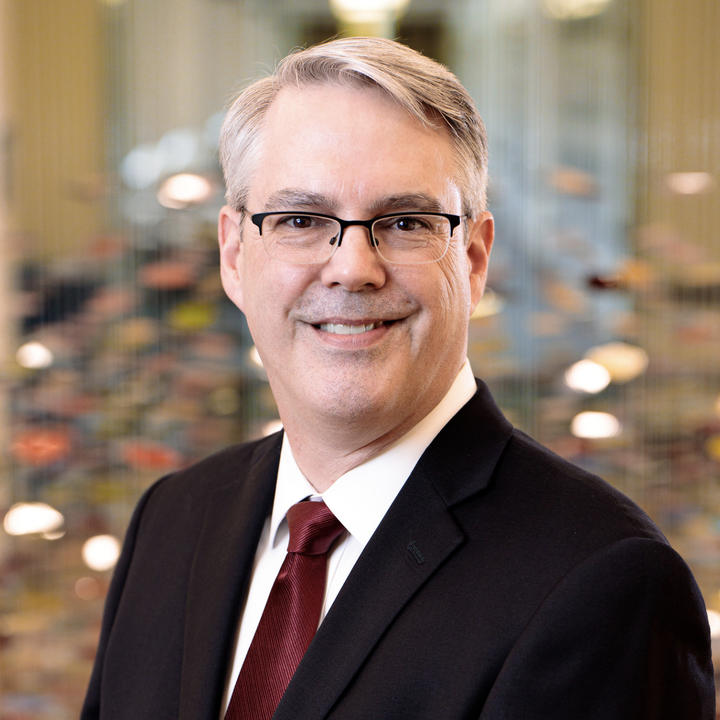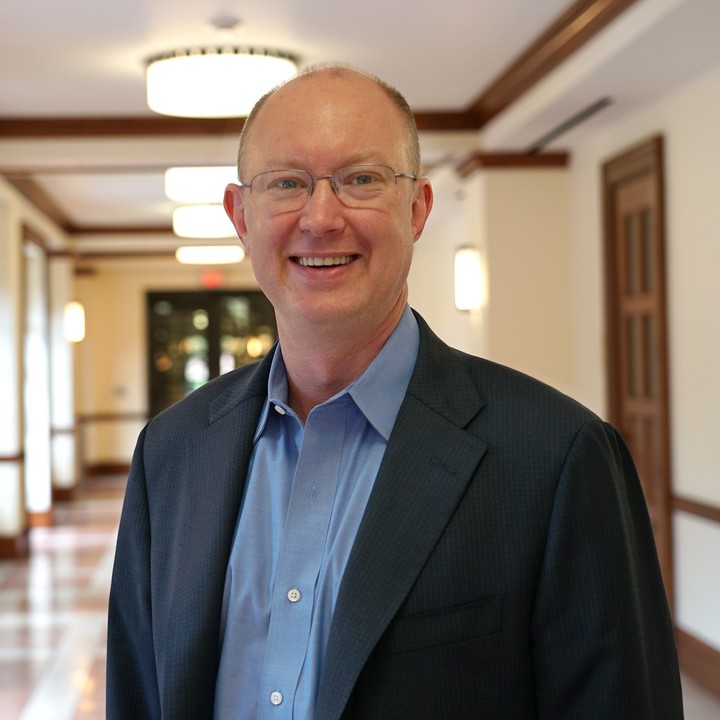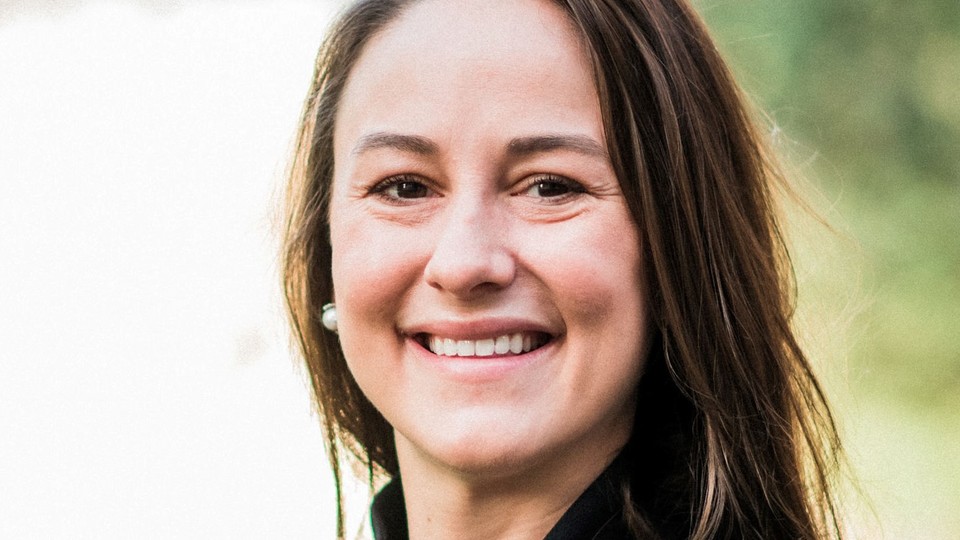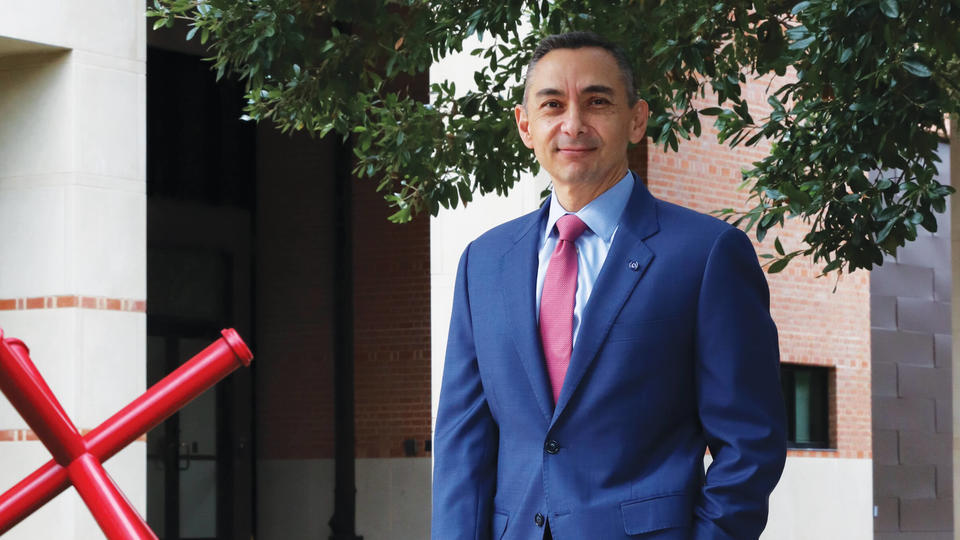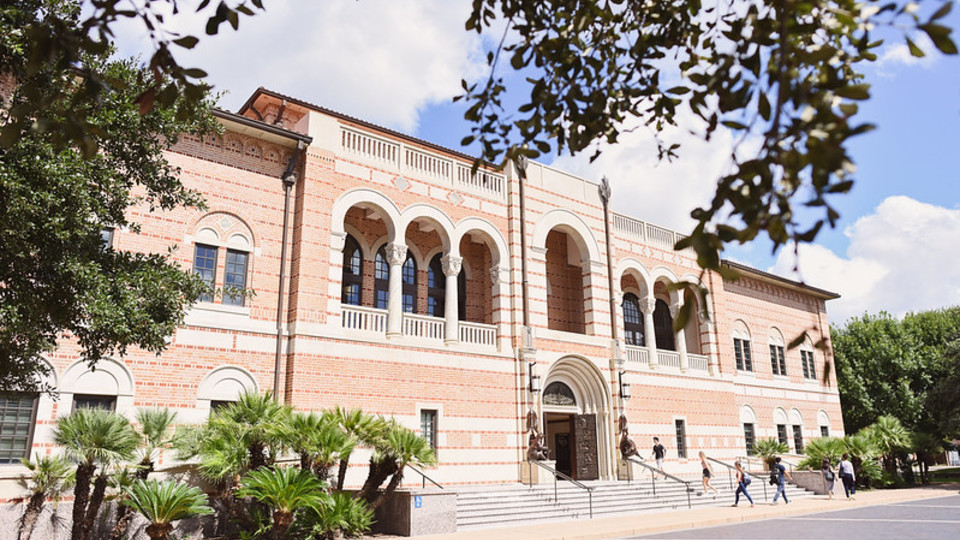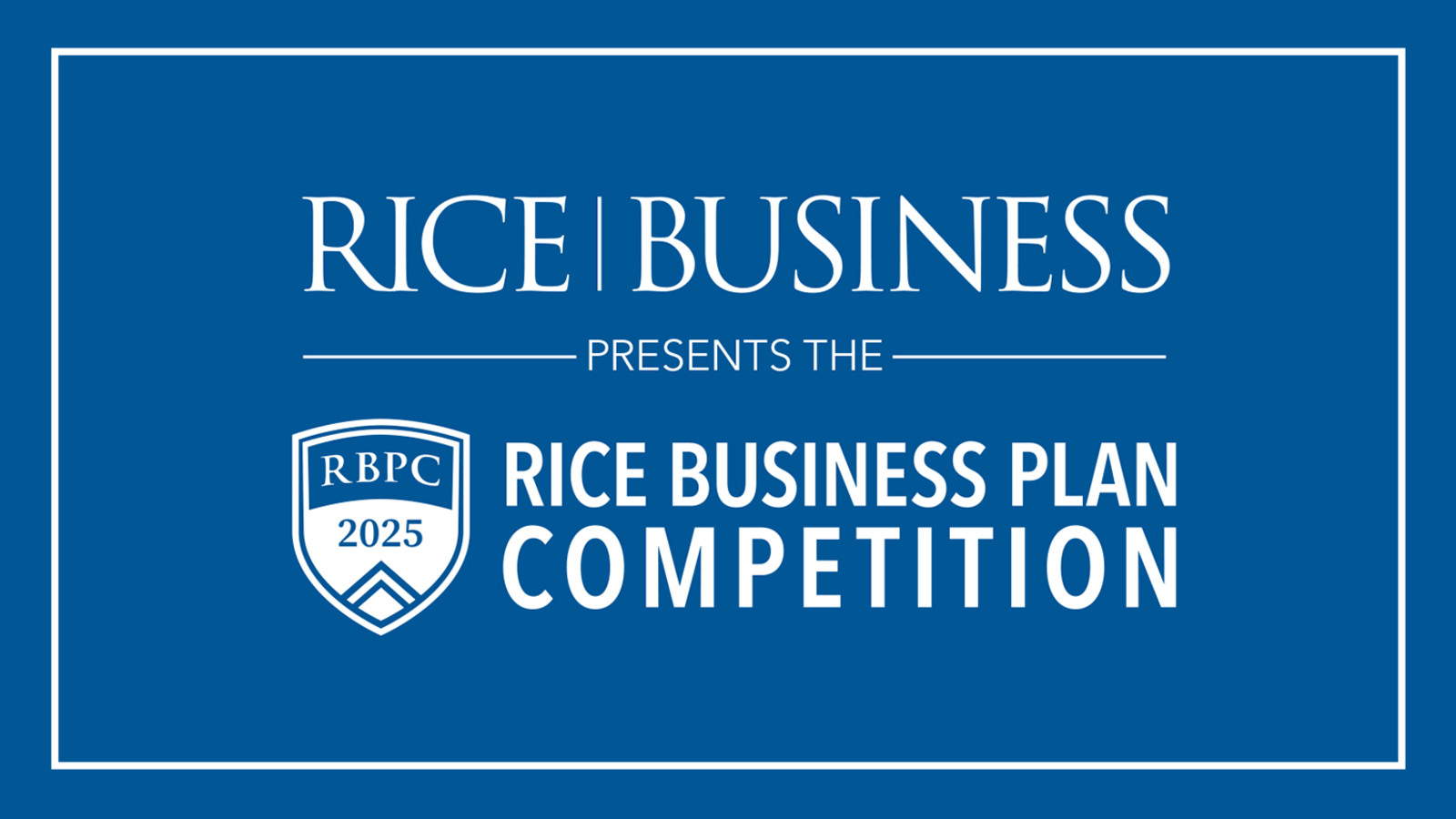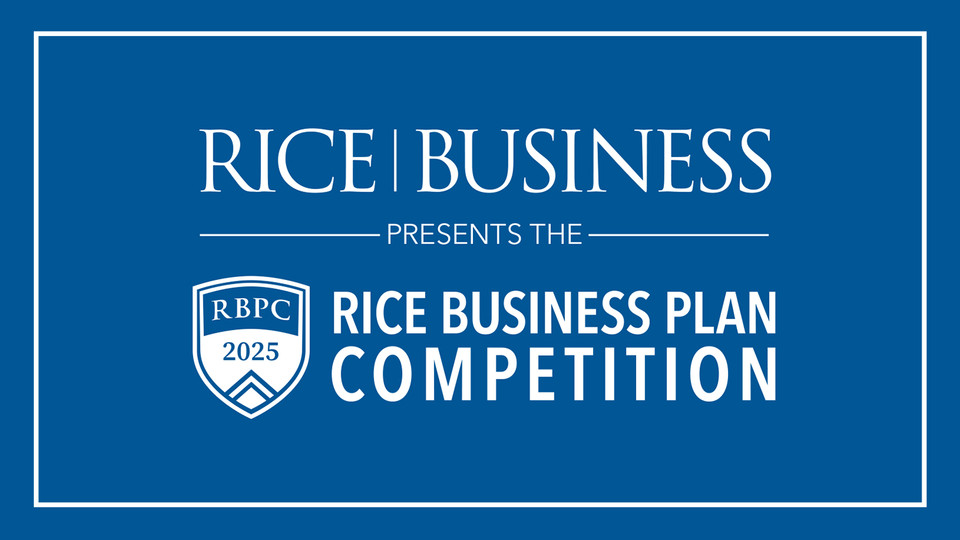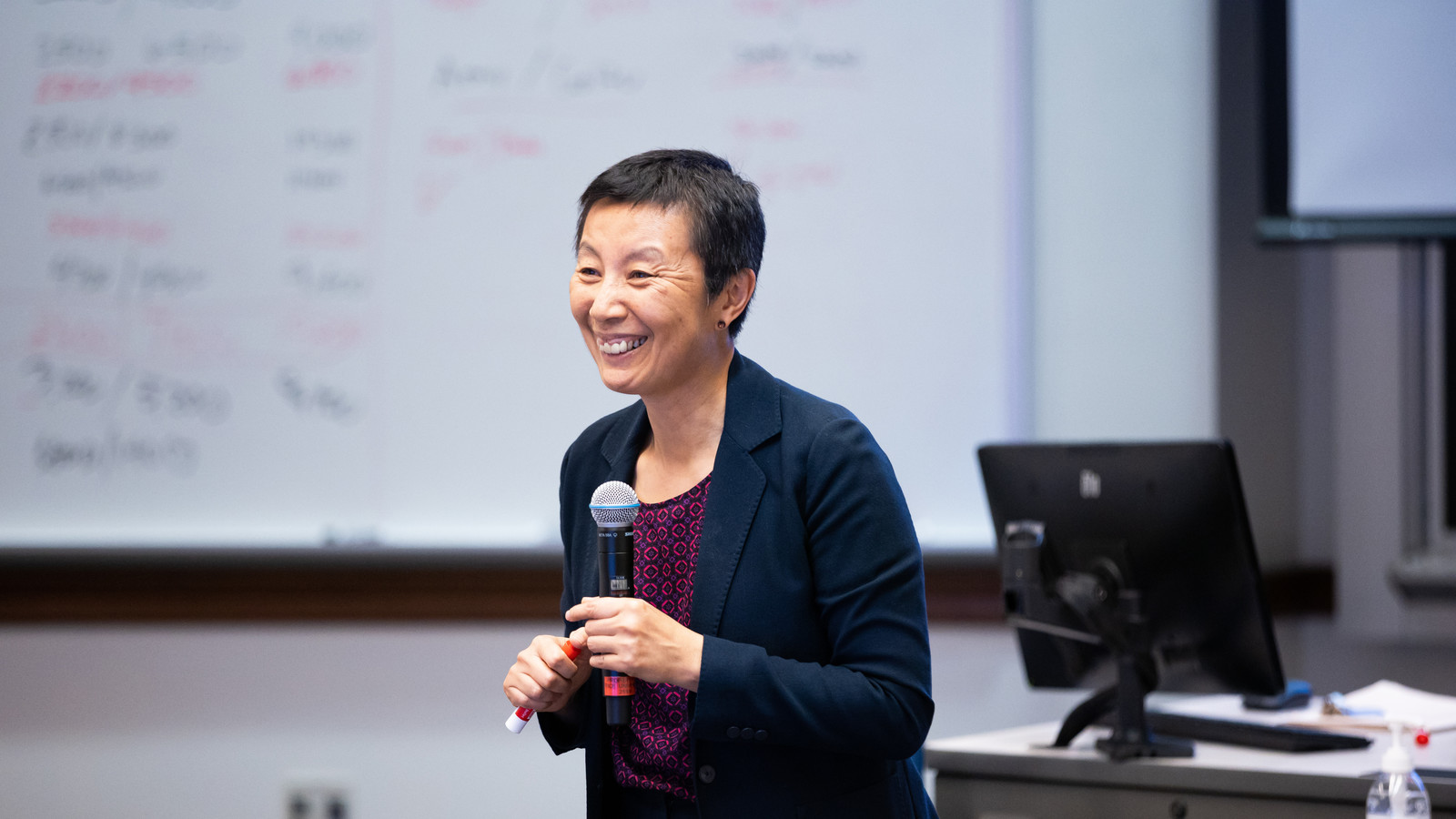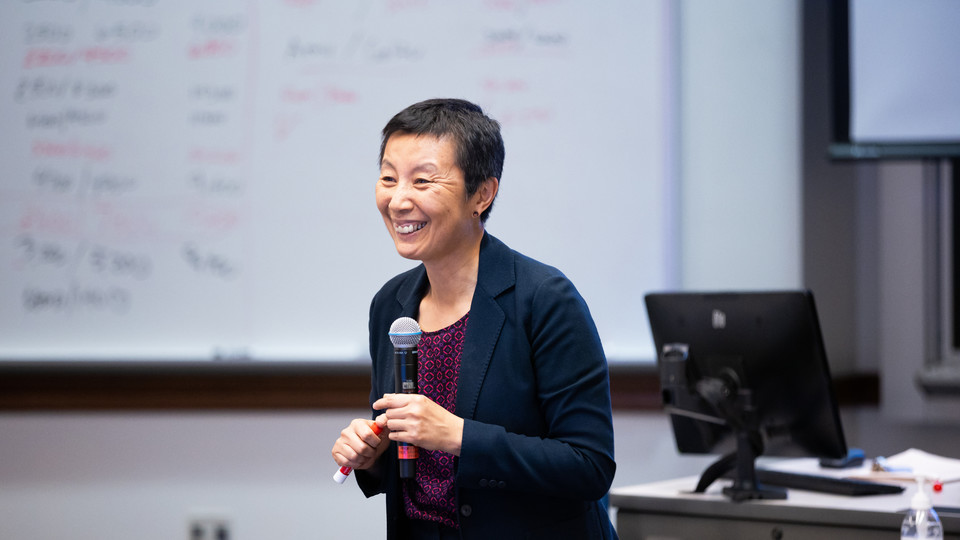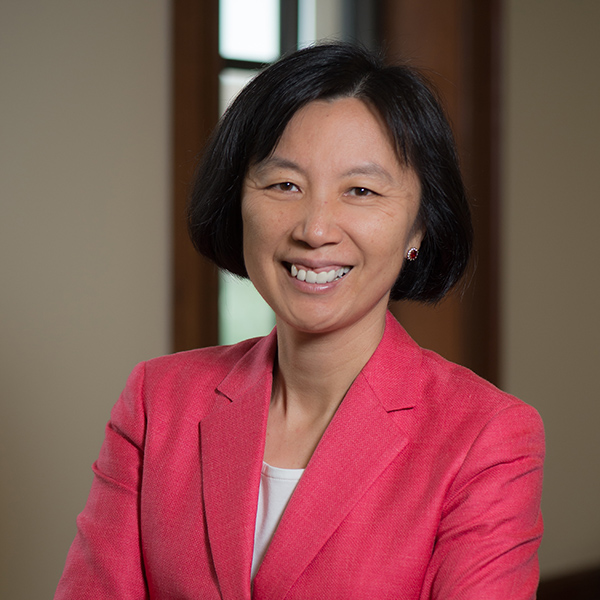[00:00]Maya Pomroy: Welcome to Owl Have You Know, a podcast from Rice Business. This episode is part of our Flight Path Series, where guests share their career journeys, the stories of the Rice connections that got them where they are.
Andrea Edmundson Bryan never expected to find herself leading a firm focused on developing critical infrastructure for the country. The native Houstonian and English major started her career as a Fulbright Fellow, teaching English in Malaysia. Now, the Chief Administrative Officer at Race Rock Infrastructure and the Rice Business Alumni Board member shares her story of how transformational mentors and Rice Business lead her to finding her true passion of leading and preparing our nation for the future in transportation, telecommunications, and energy.
Welcome to Owl Have You Know. I'm your host, Maya Pomroy. Our guest today is Professional MBA from the Class of 2020, Andrea Edmundson Bryan.
Andrea, thank you for joining us today.
[01:00]Andrea Edmundson Bryan: Thank you so much. Happy to be here.
[01:02]Maya Pomroy: So, you were part of that 2020 cohort that never got to walk across the stage.
[01:08]Andrea Edmundson Bryan: We walked. We were just a year later, but we walked later. Yes.
[01:12]Maya Pomroy: Okay, you started at Rice in 2018. Oh, the glory days.
[01:17]Andrea Edmundson Bryan: Yes, exactly.
[01:19]Maya Pomroy: And you are currently the Chief Administrative Officer at Race Rock Infrastructure, which is a leader in the critical infrastructure industry and energy industries. And you've been doing that for quite some time. What drew you to that line of work?
[01:36]Andrea Edmundson Bryan: Well, it’s funny that you asked that, because if you'd asked me that 10 years ago, I would have never said that I would be here. Just by a series of events and, kind of, the path that I went down, I think I really give credit to the individual that I've been working for for the last 10 years, my boss, Donnie Young.
And we started off in oil and gas. I started working with him in 2014. We had a path for five years at a previous company there. And he ultimately sold that business. And when he exited that business, I left with him, which was in between my first and second year at Rice. And we looked around and, kind of, figured out what we wanted to do next. And highway infrastructure, steel manufacturing fell into our lap in November of 2020. And so, that was the first acquisition that we had. And we have just built…we spent the last four years building that business. And so, being in this field is not something that either one of us, I think, sought out, but are thrilled to be in it. It's a great business in the state of Texas and in the United States as a whole, especially right now. So, it’s a great business and the Race Rock is doing extremely well. So, very, very happy and fortunate.
[02:38]Maya Pomroy: Well, we'll talk about Race Rock in just a little bit, but I want to talk about your upbringing and your childhood. So, you were born and raised right here in Houston, Texas.
[02:46]Andrea Edmundson Bryan: Yeah, born and raised Houstonian, very proud Texan. I think I'm a seventh or eighth-generation Texan from family lineage. Yeah, I went to St. Agnes for high school. I went to TCU for undergrad.
[02:58]Maya Pomroy: You were an English major.
[02:59]Andrea Edmundson Bryan: English major, yes, which is, kind of, a unique track. I love telling people this. I'm the middle of three children. My dad's a physician here in Houston and my mom is a nonprofit. And my dad said, “Look, you can go anywhere you want to go. We will support you to do that. But you have one stipulation. You have to have a degree in liberal arts from an undergrad.” And so, my brother, sister, and I all did that, kind of, a different track. You know, you hear a lot of people say you need to go in accounting, finance.
[03:22]Maya Pomroy: Yeah. I'm curious about why. I mean, he's a physician. I was thinking you were going to say, “You gotta be a doctor.”
[03:28]Andrea Edmundson Bryan: No, he said liberal arts and, kind of, really embodied this philosophy that you go to undergrad, you know, college to really learn how to think critically and analyze and read and write, and then go out and get a job, figure out what you really like and specialize. And so, all three of us have done that.
And for a long time, people were like, “An English major, what are you going to do with that? Like, where are you going to end up? You don't want to teach long term or go get a Ph.D.” But it has served me so well, because I think it really did set us up, all three of us and myself, specifically, to think critically and be able to analyze. And I think that, kind of, plays into your original question of how I ended up in infrastructure. You just, kind of, take a path and you learn as you go and think through problems. And, you know, people… early on in my career, a mentor of mine told me, numbers are easy. People are always your problem when it comes to business. I think that translates anywhere. And so, very grateful for the path and having that English undergrad degree.
And then, of course, as you can imagine, going to Rice, it was a feat for me to get through, you know, the rigorous coursework at Rice Business, but I'm so grateful for it. And I think that that English foundation really helped me, kind of, struggle through it efficiently and, ultimately, very successfully.
[04:36]Maya Pomroy: So, you went to TCU.
[04:38]Andrea Edmundson Bryan: I did, go frogs, yes.
[04:39]Maya Pomroy: Yes. Up in Fort Worth. Wonderful town as well. Not knocking Houston, but Fort Worth is really, really thriving. What made you choose TCU?
[04:47]Andrea Edmundson Bryan: Well, it's funny, you know. I really wanted to go to that big university in Austin, but they wouldn't take me. So, TCU, kind of, fell into my lap, but I tell people all the time that I wish my college experience on everyone. I had the best four years in Fort Worth at TCU — socially, academically, culturally, in every area. And it was the best fit. And I, to this day, stay actively involved. I serve on the Board of the Honors College there, go to football games, the whole nine yards. And obviously, having an office and manufacturing facility for Race Rock in Fort Worth is fun. And my husband and I have a house there that we maintain. So, lots of connections to Fort Worth that we hold really special to us.
[05:28]Maya Pomroy: And your husband is also Texan through and through, correct?
[05:32]Andrea Edmundson Bryan: Yes, he is, yeah. Those roots are very, very deep. A seventh, eighth-generation Texan as well. A lot of Texas pride, I think, in the family, for sure.
[05:41]Maya Pomroy: Well, and so, tell me about the Bryan Museum in Galveston, because that is your family's museum.
[05:47]Andrea Edmundson Bryan: Yes, my father-in-law's collection of, you know, basically, the settlement of the West. So, lots of Texas history. And it's a huge collection. I'm biased, but it's phenomenal museum and building and structure. And all the items in the collection are fantastic and phenomenal.
So, we stay involved on a family level, but then on a personal level, you know, being such a proud Texan, it's a fun thing to do and be a part of and support. And our history in the state is rich. I have so much of it. As someone, I spent a year abroad teaching English in Malaysia right after undergrad at TCU. And I was telling someone the other day that there were 50 of us that went from the U.S. to go teach and I was the only Texan in the group.
[06:29]Maya Pomroy: Really?
[06:29]Andrea Edmundson Bryan: And when people asked, you know, where we were from, down to the last person, everyone would say, “Oh, we're from the States.” And I'm the only person that, when asked, every time…
[06:37]Maya Pomroy: “I'm from Texas.”
[06:38]Andrea Edmundson Bryan: “I am from Texas. I am from Texas.” So, you know, bigger, brighter, louder, all the things, but lean into that really hard. And so, the museum has been something really fun to watch. We're about to celebrate the 10-year anniversary in 2025. So, it opened in 2015. Great for all ages, children, all the way up to adults. And there's everything for every need, from an artistic standpoint, you know — documents, saddles, spurs, guns, maps, paintings, videos, dioramas. I mean, the whole thing. It's so interactive and it's phenomenally done. My father-in-law has a huge niche and ability to see things and create these stories. So, it's a beautiful, beautiful collection in a gorgeous building down in Galveston. Yeah.
[07:20]Maya Pomroy: I love that. So, you had mentioned that, after you graduated from TCU as an English major, you went to Malaysia to teach English. So, how old were you? Were you 22 when you decided to do that?
[07:30]Andrea Edmundson Bryan: Yeah, I was 22. Yeah. I went and taught English in Malaysia under the Fulbright scholarship. So, I went through the State Department. And I vividly remember applying for that and thinking going home the day I applied and just weeping in the shower, being like, “What have I done? Like, if I am so fortunate enough to receive this, like, you don't turn this down.” And I have no idea where Malaysia is, really, on a map. Like, I will know no one. I'm terrified. And it was a profound moment for me that I've, like, “Okay, this is a big deal. Like, you're adulting, really. Like, you're going to graduate college and potentially go somewhere.”
[08:05]Maya Pomroy: To the opposite side of the planet.
[08:08]Andrea Edmundson Bryan: Literally, like, that's what I would tell my students, like, “Here's a globe. Here's Houston. Go to the other side. And that's Malaysia, you know, 24 hours to get there.” But spent a year, was fortunate enough to be given a spot, and spent a year teaching high school English in a very, very rural town, about an hour north of Singapore. So, I was in the Southern part of Malaysia and traveled all over Southeast Asia, got down to Australia. It was an adventure of a lifetime. And I think really, kind of, again, foundational roots on, you know, pick yourself up by your bootstraps and figure things out and think through problems. And how do you eat an elephant? One bite at a time. And so, after, you know, 10 months, looking back, it was a transformative year in my life that I will forever be grateful for.
[08:51]Maya Pomroy: So, tell me some of the most profound things that you learned from that experience. I know that it's really hard to condense something like that, but if you were to write a book and there was a chapter about this experience that you had. And how many total scholars were invited to go?
[09:10]Andrea Edmundson Bryan: Fifty. So, the program I had initially applied, because there were only 15 spots and about, historically, 30 applicants. So, I was like, “Oh, the odds are in my favor here.” Like, you know, it's one of the smaller kind of cohorts. And the year I was granted a spot, the Malaysian government infused a lot more money into the program. And so, our program went from 15 to 50. So, we were, kind of, a guinea pig year in that capacity.
But there were challenges. And so, there were days, for sure, I would be lying, if I said there weren't days being like, “Can I do this? Like, I'm a girl from Texas that never had…” I had never… I traveled to Mexico with my family, but I had never been to anywhere in Asia. I had never been anywhere in Europe. I'm thinking, “Can I really do this?” And you're a lot stronger than you think you are, I think, is my biggest takeaway from my experience in Malaysia. And I hold on to that, you know, when I have challenges at work or at Rice and school. Like, I can do this. We can do hard things, right? And so, I think that would probably be, for sure, my biggest, takeaway — you're a lot stronger than you think you are.
[10:12]Maya Pomroy: Well, and I think that that's a common thread through lots of Rice grads, because I think, taking this leap to go pursue an MBA is something that, it's a choice, right? It's a choice that you make and you have to really believe in yourself, even when it's the most, you know, challenging thing to do and you're like, “Oh, my gosh. Am I smart enough? Am I strong enough? Do I have the time to do this? Am I going to sound like a fool if I speak up in class,” and all of those things.
[10:39]Andrea Edmundson Bryan: All of those things. It's so true. And it's not just at, you know, at Rice. It’s out when you get out into the real world. Like, all of those things constantly are presenting themselves in business and day-to-day life.
[10:48]Maya Pomroy: So, once you got back from Malaysia, was that your, sort of, move into Race Rock?
[10:54]Andrea Edmundson Bryan: Yeah. So, a little bit of a stint in which I came home from Malaysia at the end of 2012, worked for a small company in 2013, and then, in 2014, my resume landed on my current boss's desk, Donnie, and he hired me.
[11:07]Maya Pomroy: Who's a mentor to you?
[11:08]Andrea Edmundson Bryan: Yeah, for sure. Having… yeah, having worked for someone, for the same person, for 10 years now. And I had no idea what I wanted to do. And I think this is something that you hear a lot from college graduates, you know. Now, I still, when I'm talking to people or trying to be a mentor myself, and they say, “I have no idea what I want to do,” and I say, “Don't wait for the perfect job. Just go get a job.”
[11:30]Maya Pomroy: Perfect job doesn't exist.
[11:31]Andrea Edmundson Bryan: It doesn't exist. Like, I'm still trying to figure out what I want to be when I grow up, right?
[11:35]Maya Pomroy: Aren't we all?
[11:36]Andrea Edmundson Bryan: Aren't we all? And so, Donnie hired me as his assistant, and I said, “Look, I don't know if I want to do this for my whole life. I don't think I do. It’s like I do know I want to go back and get my MBA at some point.” I knew that in 2014. I knew I wanted to do that. But I said, I want to learn business and I want to learn oil and gas because I'm here in Houston, I want to stay in Texas. So, show me what we can do with this. And full credit where credit's due, he did that. He took me under his wing and let me see and be a part of everything at the business, from top to bottom.
[12:08]Maya Pomroy: How big was the company in 2014?
[12:09]Andrea Edmundson Bryan: We were about 500 employees. We ultimately ended up being about 500 employees. We did a series of acquisitions. So, we weren't 500 when I started. We were an international company. And the onus, really, to get me to Rice, ultimately, was I was sitting in board meetings. I mean, Donnie was letting me sit in board meetings and I have a seat at the table.
[12:31]Maya Pomroy: What trust!
[12:31]Andrea Edmundson Bryan: And I can't read a financial statement. I'm like, “Oh, I can't… I have no idea. Like, I can hear what they're saying and I can, kind of, comprehend, but I can't read these. I can't articulate the right questions or anything.” And so, it was, you know, through that experience and that exposure that he was allowing me to have that I ultimately went to him and said, “Hey, that MBA thing, it's time. Like, I want to go do it now.” And he was fully supportive of that in every way possible.
So, it's been just such a phenomenal ride with Donnie at Hoover and then leaving and then, you know, really starting Race Rock, which, in its origin, was a family office, and starting a family office. What does that look like? And what does that take? And it was, kind of, a new adventure. And then finding out what sector we were going to be in and doing a number of acquisitions to grow and build a business, it's been fantastic. I've learned so much that I feel like a lot of people at my, kind of, my age or point in their careers maybe haven't had that type of exposure or experience from top to bottom, because I've seen it all and I've done it all. It's been great. Fantastic.
[13:30]Maya Pomroy: Well, so that's fascinating that it was a family office. And so, tell me the roots of how that grew.
[13:35]Andrea Edmundson Bryan: Yeah, I mean, it was Donnie and myself in an office. We just, you know, how does this work? And, you know, I guess we need some computers and some printers and, you know, Wi-Fi. I mean, it really started off so basic and then, kind of, really developing into, do we go, kind of, private equity? Do we start a fund? Do we raise money? We’ve talked about doing a SPAC. What does that look like? What industry do we want to be in? Back in oil and gas, something totally different. Hoover was a rental container manufacturing business.
[14:03]Maya Pomroy: So, let's back up. So, we didn't talk about Hoover, yet. So, tell me about Hoover.
[14:06]Andrea Edmundson Bryan: Yeah, it was a rental container manufacturing business. So, those, kind of, in basic terms, those stainless steel IVC tote tanks that you see out on rigs or stacked on the back of 18-wheelers, that was the bread and butter of that business. So, it was a rental business in manufacturing.
So, again, if someone had asked me at TCU, “Hey, you think you're going to go into oil and gas manufacturing,” I would have said, “No, don't think so. What? Yeah, I don't think so.” And so, Hoover was a fantastic business. And I learned a lot about, you know, oil and gas and how that works. But again, working so closely with Donnie, I was really getting to know, like, what goes on in an office and how does that really happen? What does it take to make that run and, you know, employees and the challenges and what people want and what they fear, all those things.
[14:50]Maya Pomroy: So, that was the beginning with Hoover.
[14:52]Andrea Edmundson Bryan: That was the very beginning. Yeah, that was Hoover. And then, Hoover was ultimately sold to private equity. So, I got to see a process run. And then, acquisitions were done after that sale. So, I saw, you know, acquisitions happen. So, there, I had seen so many things and been a part of so many things, integration efforts, that I knew a lot more than I thought I did about what it takes to make a business, kind of, hum and what goes into that on a day-to-day basis.
And then, you know, from Hoover, when Donnie ultimately stepped away from that business and I, kind of, sat there and I was like, “Well, this has been a really fun ride, Donnie. Like, thank you for the five years.” And he was like, “Oh, no, you're coming, too.” I was like, “Oh, okay. We're going.” I was in between my first and second year at Rice. So, it was such an interesting time for me having… you know, I was in the throes of business school and really figuring out, what do I like about this? What am I drawn to? And then, kind of, a full other shift in a professional sense on, what is that next step going to look like? And so, yeah, to your point, a lot of trust that we were going to land… I knew that Donnie would land with his two feet on the ground. There was no doubt about that. Yeah. And I knew that it would be a new challenge for me to, kind of, what's going to be next? And so, setting up a family office was, kind of, the first step and what that looked like. And it was, you know, everything from the bottom up.
And that had always, kind of, been my mentality, the idea of being above no task and I'm not afraid to ask questions or understand why we're doing something. And so, that really played well into building that office and then ultimately building a team. And then Donnie found a business that he wanted to go after. And so, again, having that, you know, previous exposure to mergers and acquisitions at Hoover, we started doing that at Race Rock and acquired structural and steel products in November of 2020. And Race Rock, the genesis took on what it is today. And the business has just grown exponentially.
[16:47]Maya Pomroy: Thrived, yeah.
[16:47]Andrea Edmundson Bryan: Yeah, it's thrived. We moved offices. The team, now in Houston, there's eight of us here in the Houston office. And we've got almost 500 employees across the organization, across the United States. So, through a series of additional acquisitions, we've just continued to build and grow out Race Rock.
[17:04]Maya Pomroy: So, tell me about Rice. And first of all, what did your husband say when you're like, “I'm going to go get this MBA?”
[17:10]Andrea Edmundson Bryan: He was like, “Of course, you are.” You know, he was so supportive. And we were together at that time, but yeah, to throw another, kind of, life situation that happened, we got engaged while I was at Rice. So, we got married, you know, right after supposed to be graduation. We got married in May of 2020.
[17:31]Maya Pomroy: May of 2020? Oh, my gosh, you got a wedding?
[17:34]Andrea Edmundson Bryan: Yeah, I know.
[17:35]Maya Pomroy: That's amazing.
[17:37]Andrea Edmundson Bryan: Yeah, it's funny. There was something, you know, to it. We'd gotten engaged and I was like, “Okay, we're going to get… I'm going to graduate and I'm going to get married two weeks later, because why not? Let's just do everything all at one time.”
[17:47]Maya Pomroy: Well, you learned that you're stronger than you think, right?
[17:51]Andrea Edmundson Bryan: Exactly, exactly.
[17:51]Maya Pomroy: I'm stronger than I think I am. And you are.
[17:55]Andrea Edmundson Bryan: And a crazy person for wanting to do all of that. But then, when the world, kind of, shut down in March and it looked like this may be a little bit longer than a-couple-of-week thing, I was like, “You know what? There's just something in my gut telling me, don't cancel this and try to adjust it. Just keep it.” And so, we went from 300 people to 12, just family, and kept the date. And it was magical and perfect and everything I could have ever wanted and hoped for in a wedding. So, I was thrilled. I wanted to get married. I didn't want to have a wedding. So, we did that. And, you know, I had front-loaded all my second-year courses because I was like, “Oh, we're going to have a graduation and a wedding. I'm going to be trying to be planning. So, let me try and get the slate pretty much clean by March so that I can really, you know, focus on the wedding.”
[18:41]Maya Pomroy: And then you got March.
[18:42]Andrea Edmundson Bryan: And then March came. And when everyone went online, I just, kind of, stayed home. Like, I didn't really have to do that transition as much as most of my other classmates that had not front-loaded as heavy as I had. Maybe that's why my overall experience was, I just paused it everywhere. Like, I didn't have to transition to online classes, which I know was just a weird time for everybody, right? But Rice, overall, was fantastic. And lots of things, as I've highlighted, kind of, happened in my two years there. You know, like, pivoting, leaving companies, starting new ones, getting engaged, getting married. And then also just everything about Rice. While you're in school, all of those things happen, too.
[19:22]Maya Pomroy: So, tell me about your cohort. So, that was 20… so, you started in 2018 to 2020. Because I know some folks from that cohort.
[19:29]Andrea Edmundson Bryan: Oh, you do?
[19:29]Maya Pomroy: I was a little bit later, but, yeah, I started in 2020 when…
[19:32]Andrea Edmundson Bryan: Okay, when I was ushering out, you were coming in.
[19:34]Maya Pomroy: Well, it was around… it was around COVID time, maybe a little bit before, was when I applied and got the great news, and then COVID happened. I'm like, “What? Wait?”
[19:43]Andrea Edmundson Bryan: “What is this going to look like? Yeah, I'm not sure.”
[19:47]Maya Pomroy: Yeah.
[19:48]Andrea Edmundson Bryan: I mean, phenomenal. I mean, I'm just I was, kind of, like a kid in a candy store, just, like, seeing and hearing all these people and talking to all these, you know, like-minded but super smart, talented people from all different walks of life, all different backgrounds, just a diverse class all the way around and have made lifelong… two of my best girlfriends to this day, I met and made at Rice Business. Was in one of their weddings. Yeah, I mean, it's just like all of those things. So, just like my TCU experience, I, kind of, wish that on everyone else, that when they think about doing an MBA program, that they have the experience I had at Rice, which was phenomenal. It was great. Everything about it, from professors, faculty, atmosphere, culture, social, everything about it was awesome. And I continue to show that to people in my, kind of, involvement with Rice since graduation that I feel really passionate and strongly about and giving back, and I'm always the first person if someone reaches out and say, “Hey, I have somebody that's thinking about, you know, MBA,” I'm like, “Let me talk to him. I'll talk to him. Let me talk to him.” Even better, if they say they want to go to Rice, I'm like, “Oh, this is an easy one.” I'm always, kind of, singing, you know, Rice's praises and wanting people to consider it for sure, if they're considering getting an MBA.
[21:06]Maya Pomroy: Well, your favorite classes, your favorite professors, you got to choose. Sorry.
[21:09]Andrea Edmundson Bryan: I mean, so many. I think Lansford… and this may shock people in financial accounting, but that was my first, you know, they let you lead off with that. And it's probably one of my hardest classes, that English undergrad. You know, I think I took a basic math class at TCU. I didn't have to take anything other than that. And so, it really, kind of, kicked into gear what I was doing and helped me…
[21:32]Maya Pomroy: Well, you were sitting in that boardroom with those financial statements. So, you're like, “Ahh…”
[21:35]Andrea Edmundson Bryan: Yeah, it’s like, “This makes sense now.” And he was phenomenal and just, you know, a great teacher. But there were so many. And I found myself, you know, getting involved in things on campus, Board Fellows, which was a phenomenal experience. I continue…
[21:49]Maya Pomroy: Who are you with?
[21:51]Andrea Edmundson Bryan: The landing was the nonprofit that I was with. So, kind of, a safe house for women in sex trafficking here in Houston. And brought a lot of board governance to that experience since I'd had it at Hoover, right? So, they were thrilled to, kind of, have that brought to the table. And then served on the exec team for Board Fellows because I felt so passionately about it. I think my mom's nonprofit background really, kind of, came out through me in that experience.
[22:15]Maya Pomroy: Ignited that, yeah.
[22:15]Andrea Edmundson Bryan: Yeah. And then, you know, that weaves into the involvement that we have at the Bryan Museum now still to this day. So, it, kind of… there's so many, kind of, flows through my journey and my path that resonate and have stops, you know, at Rice. There are tidbits.
[22:29]Maya Pomroy: They all connect.
[22:29]Andrea Edmundson Bryan: They all connect, yeah.
[22:30]Maya Pomroy: Well, so, Board Fellows, for those that don't know, who might be considering Rice, one of the phenomenal opportunities is the Board Fellows program. So, could you tell us about that?
[22:39]Andrea Edmundson Bryan: Yeah. So, they put current MBA students on nonprofit boards. And so, it's, kind of, this symbiotic relationship of getting an MBA student some exposure to, you know, kind of, a board environment, some, obviously, smaller nonprofits to larger ones. So, those atmospheres are different for each type of nonprofit organization. And then the nonprofit, the organization gets an MBA on their board, which is phenomenal.
[23:06]Maya Pomroy: Win-win.
[23:06]Andrea Edmundson Bryan: The, you know, bringing your… it's a win-win. It's the best type of program or something that a Rice student can get involved in, but also, like, giving back to the community here in Houston. It's just, I love it so much. It was a great experience. And I'm a big supporter of it and actually have, kind of, connected the Bryan Museum to getting a board fellow on their board. Now, you know, after 10 years, the board has really, kind of, taken shape. And so, yeah, if you're a nonprofit here in Houston wanting a Rice MBA board, you know, member for a year, you should definitely reach out to Rice and get your name in the mix to be part of Board Fellows. It's a great idea.
[23:42]Maya Pomroy: I had a couple of close friends that did Board Fellows as well. And it was life-changing for them. It was just such a great opportunity to really be engaged in the Houston nonprofit scene. And there's so many different organizations. You were saying sex trafficking. There's also the Center for Houston's Future. I mean, it was so many different ones that really benefit and the student benefits, too. And I'm not sure that many schools have that kind of opportunity.
[24:11]Andrea Edmundson Bryan: It's highly sought after. You know, it's very competitive at Rice. You have to apply and do all of the…
[24:16]Maya Pomroy: It’s competitive.
[24:17]Andrea Edmundson Bryan: It's very competitive. But there's a level of importance with that, too. And I think getting individuals at Rice, you know, more aware and involved in nonprofits here in Houston, which are, to your point, there's thousands of organizations that exist here and do great work. And so, you know, connecting the Rice MBA students to that, I think, is phenomenal.
[24:36]Maya Pomroy: So, speaking of great work, let's talk about your great work that you're working on now. So, there's definitely big shifts in energy and technology right now. And you're, sort of, at the forefront of that with Race Rock. So, tell me about the kind of work that you're doing now and what you're the most looking forward to and how your company is going to continue to grow.
[25:00]Andrea Edmundson Bryan: I mean, there's so many, you know, big and exciting things going on. I think in, you know, in the highway infrastructure space and the arena that we play in, you know, steel manufacturing and galvanizing, there's just, there's always room for improvement, right? Everyone drives down the street. Everyone drives on highways. And you see the structures that hold the signs on freeways.
[25:20]Maya Pomroy: Nobody thinks about that, though. I was talking to one of my kids the other day and we were talking about property taxes and federal tax, like, those are these things everybody takes for granted. You know, you don't think about where they're just there.
[25:34]Andrea Edmundson Bryan: Yeah, they're just there until… and they're there until you need them, right? And the guardrails along the highway that protect you if you get into an accident. We really pride ourselves on, you know, providing safe passage for people in power. That's our, kind of, motto and what we hold on to. And I think that it's true in the energy transition space and there's a lot of people moving around all the time, especially, you know, here in Texas, with the amount of highways and freeways that we have. So, it's exciting work. It's great work. You know, the manufacturing industry is strong and it is the backbone of so many parts of this country and the people that we [crosstalk 26:09].
[26:09]Maya Pomroy: Coming back, right?
[26:10]Andrea Edmundson Bryan: Coming back, we hope, yeah. In a lot of ways, we, you know, we've felt like it's never gone away because the business has done so well, but yeah, it’s coming back and we have operations in Ohio and in Connecticut. And those areas are, you know, equally as important and critical to the infrastructure of our country. So, it's great. And we're looking forward to everything that, you know, we have in store for 2025. The business is booming. There's lots of work to be done. Lots of utility structures, large poles. If you go check out our website, our Instagram, you'll see all the huge structures that we make and produce and provide safe passage for people in power across the United States.
[26:51]Maya Pomroy: Yes, which, you know, in Houston, most recently, has been hit by quite a bit of, you know, weather-related traumatic and weather-related events. And so, I'm assuming that that's something that Race Rock also participates in. And it's really vital and you don't realize how vital and crucial it is until it's not there.
[27:11]Andrea Edmundson Bryan: Until it's not there and you need it, yeah, exactly. So, you know, creating these structures and all that it takes to do that and the teams that we've created and individuals.
[27:20]Maya Pomroy: And to withstand-
[27:22]Andrea Edmundson Bryan: Yes.
[27:22]Maya Pomroy: .. the types of storms. I mean, that’s really what it's about. It's not man-made. It’s, you know…
[27:29]Andrea Edmundson Bryan: Correct, correct. And the landscape has changed, right? Like, it has... we've seen it just in Houston this summer with Beryl, and, you know, these small births of storms that can do so much damage, right? So, creating the infrastructure that we need to maintain that and move forward is critical.
[27:46]Maya Pomroy: So, if you had a piece of advice for someone that's listening that is considering Rice Business as an opportunity but isn't quite 100% sure, because you said, you know, if somebody wants to talk about going and getting their MBA, “Yes, come talk to me.” So, what would you say to them?
[28:05]Andrea Edmundson Bryan: Well, there's never a perfect time. That's always the first thing that, kind of, comes out when I'm talking to somebody. They'll say, “Oh, I don't know if right now is the right time or in a year from now, or I'm considering.” No, there's never a right time. So, just go for it. You just do it now. Apply. There's no harm or foul in applying, and moving forward. And I also, you know, from my own personal experience, people ask me, like, why, why go get an MBA? Like, there's a lot of argument of, like, is that really necessary, you know?
[28:33]Maya Pomroy: I've had that, too.
[28:34]Andrea Edmundson Bryan: Yeah. And to me, I think it's, kind of, multifaceted. But going through something hard and challenging like that, it's always a good thing to, kind of, learn something new and challenge yourself and do something difficult and come out at the other end of that. I think that's important on a human level, on giving yourself purpose and challenging yourself and constantly learning. I fully believe in, kind of, doing that and cultivating yourself as an individual at all times.
[28:58]Maya Pomroy: An investment in thyself.
[29:59]Andrea Edmundson Bryan: In yourself. And then, also, for me, kind of, the big factors, I always wanted that tool in my toolkit. So, I can't tell you what's going to happen tomorrow, I can't tell you what's going to happen next year, what my life's going to look like, what pivots or tracks will happen, but I will always have this in my toolkit, an MBA from Rice that will always be mine. And I think it taught me so many things that I can always, in some way, shape, or form, lean on when I need it at some point — professionally, personally, all the things. And so, if you're thinking about it, my advice to you is go do it, apply. And if you get into Rice, the answer is easy. Go to Rice. You're going to have a fantastic experience and you're going to have so many doors open for you.
[29:45]Maya Pomroy: Go do it.
[29:46]Andrea Edmundson Bryan: That's right, go do it.
[29:47]Maya Pomroy: Well, Andrea, it has been so much fun to talk with you and such a pleasure to learn just a little bit, a little part of your story.
[29:54]Andrea Edmundson Bryan: Yes. Thank you.
[29:55]Maya Pomroy: And thank you for taking the time to talk with us. So very grateful for everything that you do for Rice. And we're going to keep up with you. And who knows? Like you said, nobody knows what's going to happen tomorrow. Maybe you'll be back for a pivot story.
[30:08]Andrea Edmundson Bryan: There you go. Never know. So, nice meeting you and talking to you. Thanks for taking the time.
[30:14]Maya Pomroy: Thanks for listening. This has been Owl Have You Know, a production of Rice Business. You can find more information about our guests, hosts, and announcements on our website, business.rice.edu. Please subscribe and leave a rating wherever you find your favorite podcasts. We'd love to hear what you think. The hosts of Owl Have You Know are myself, Maya Pomroy, and Scott Gale.

